By Nina Thao & Verona Deenanth
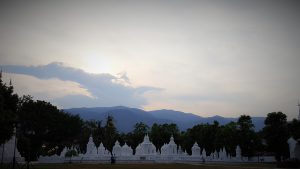
Buddhism influences Thai people in many ways. We saw that that Buddhism influences the way Thai people live daily with a balanced life and how they treat people and things. We didn’t come to Thailand expecting to gain knowledge opposite of what we were taught in school. Buddhism is supposed to be a religion and a belief that people follow. We learned that Buddhism is a way of life, not a religion.
The founder of Buddhism is Buddha Shakyamuni. He was prince and had a wife and son. At the age of 29, he realized that life was impermanent and full of suffering from desires. He wanted to achieve happiness and mindfulness so he left his wife and son to the forest where he started a spiritual life of meditation. After six years of meditation, he was enlightened in Bodh Gaya, India (Gyatso). The three Buddhist path is “to lead a moral life, to be mindful and aware of thoughts and actions, and to develop wisdom and understanding” (White).
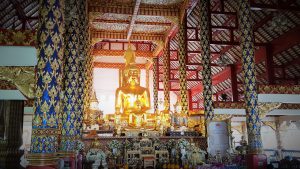 During the first week of our trip we heard a story that made us both reflect on the good and bad intentions in our everyday lives. Before telling the story, we would like to clarify that we were not present during this time and we are telling the story second handed from what we heard. In one of the vans there was a spider lingering around and one of the students said that they should kill it. I, Nina, would’ve personally killed it or ordered someone else to kill it because the presence of spiders scare me. Our tour guide said to not kill it because it’s not the Buddhist way meaning that it’s not the right thing to do. A student asked a question similar to: Why is killing animals (to eat) not wrong but killing a spider is wrong? Another student stepped in to answer and said that it’s okay to kill animals because humans need meat to eat in order to survive whereas killing the spider would be wrong because it’s not harming anyone and it’s not doing anything for us. Buddhism is all about intentions. Decisions seem to be made by whether the intentions are good or bad.
During the first week of our trip we heard a story that made us both reflect on the good and bad intentions in our everyday lives. Before telling the story, we would like to clarify that we were not present during this time and we are telling the story second handed from what we heard. In one of the vans there was a spider lingering around and one of the students said that they should kill it. I, Nina, would’ve personally killed it or ordered someone else to kill it because the presence of spiders scare me. Our tour guide said to not kill it because it’s not the Buddhist way meaning that it’s not the right thing to do. A student asked a question similar to: Why is killing animals (to eat) not wrong but killing a spider is wrong? Another student stepped in to answer and said that it’s okay to kill animals because humans need meat to eat in order to survive whereas killing the spider would be wrong because it’s not harming anyone and it’s not doing anything for us. Buddhism is all about intentions. Decisions seem to be made by whether the intentions are good or bad.
During the Monk Chat in Chiang Mai, it was very interesting talking to the Monk. A few of the things he said stood out to us. The five precepts stood out especially. They are, respect life, don’t steal and respect others, don’t be sexually promiscuous, don’t lie and don’t do drugs. Because he said these things, we started to wonder about the significant impact Buddhism has on the Thai community. One of the main things he talked about was intentions. One of our guide brought up the topic about cell phones and asked if he thinks it’s okay for Monks to have them. He said that he believed that it was okay for Monks to have cell phones. He believed it was only okay if they had good intentions. Many monks use their cellphones to learn about the modern world, and to keep up this fast changing society that we have. Some Monks use their cellphones to call their families and to keep in contact with them. That’s when we realized that your intentions are they only thing you have control over. You can choose to do good, you can choose to avoid the bad. But it’s all dependent on you. Being in Thailand we noticed, especially in the more rural area people are very kind and welcoming. Before coming to Thailand we were always told to keep track of our things because it might get stolen but based on our experience we saw that in the communities where we were, people had good intentions and they were very good to us.
Another thing we noticed is that though Thailand is an evolving country, communities in the north, in the mountain area, they still have intentions of being one with nature. A lot of the villages depend on farming and agriculture for a base of income. But, even though they depend on it for their income, they don’t take advantage of nature. They work towards using natural products to grow their vegetables. Also, nature is something that helps to bring calmness and mindfulness. From my personal experience I, Verona, am always more calm and peaceful when looking at plants, trees or flowers, anything in nature that’s green. Even in Bangkok, where the city is insanely busy, there are green spaces on the roads and at a lot of corners. We view these green spaces as a way of promoting calmness and mindfulness even in a hectic and busy city.
Overall, although the many view Buddhism as a religion, coming to Thailand we were told that Buddhism isn’t a religion, it’s a way of living, a lifestyle. Through just 3 short weeks in Thailand we have observed that Buddhism truly affects how Thai people love daily. We can also see that Buddhism is a very important part of the lives of Thai people considering the large amount of temples in Thailand, in very convenient locations as well so the locals have easy access to the temples.
June 2, 2016
Works Cited
Gyatso, Geshe Kelsang. “About Buddhism.” About Buddhism. N.p., 2007. Web. 01 June 2016.
White, Brian. “Basic Buddhism.” Basic Buddhism Guide. Buddha Dharma Education Association & BuddhaNet, n.d. Web.

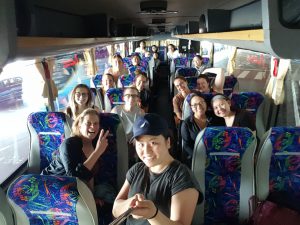
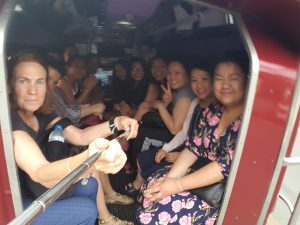


 During the first week of our trip we heard a story that made us both reflect on the good and bad intentions in our everyday lives. Before telling the story, we would like to clarify that we were not present during this time and we are telling the story second handed from what we heard. In one of the vans there was a spider lingering around and one of the students said that they should kill it. I, Nina, would’ve personally killed it or ordered someone else to kill it because the presence of spiders scare me. Our tour guide said to not kill it because it’s not the Buddhist way meaning that it’s not the right thing to do. A student asked a question similar to: Why is killing animals (to eat) not wrong but killing a spider is wrong? Another student stepped in to answer and said that it’s okay to kill animals because humans need meat to eat in order to survive whereas killing the spider would be wrong because it’s not harming anyone and it’s not doing anything for us. Buddhism is all about intentions. Decisions seem to be made by whether the intentions are good or bad.
During the first week of our trip we heard a story that made us both reflect on the good and bad intentions in our everyday lives. Before telling the story, we would like to clarify that we were not present during this time and we are telling the story second handed from what we heard. In one of the vans there was a spider lingering around and one of the students said that they should kill it. I, Nina, would’ve personally killed it or ordered someone else to kill it because the presence of spiders scare me. Our tour guide said to not kill it because it’s not the Buddhist way meaning that it’s not the right thing to do. A student asked a question similar to: Why is killing animals (to eat) not wrong but killing a spider is wrong? Another student stepped in to answer and said that it’s okay to kill animals because humans need meat to eat in order to survive whereas killing the spider would be wrong because it’s not harming anyone and it’s not doing anything for us. Buddhism is all about intentions. Decisions seem to be made by whether the intentions are good or bad.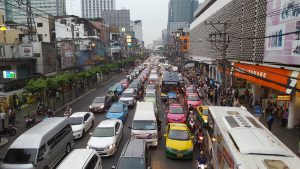
 reaking out, the instructor kept her calm and continued to teach us how to cook. I felt like it was a very busy moment because everything and everyone was so chaotic with the insects. There were moths landing in the instructor’s hair, near her face, the food, on the people in the audience, and everywhere that I could think of, she and her husband kept going and did not lose control. Even though I was terrified and scared, I noticed how smooth and controlled she continued to talk. They took the situation really well and I felt like their harmonious reaction influenced everyone else calm down.
reaking out, the instructor kept her calm and continued to teach us how to cook. I felt like it was a very busy moment because everything and everyone was so chaotic with the insects. There were moths landing in the instructor’s hair, near her face, the food, on the people in the audience, and everywhere that I could think of, she and her husband kept going and did not lose control. Even though I was terrified and scared, I noticed how smooth and controlled she continued to talk. They took the situation really well and I felt like their harmonious reaction influenced everyone else calm down.